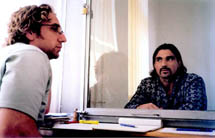Capturing The Whiskey Robber
It's a safe bet that bad boy actor Johnny Depp, famous for portraying oddballs and eccentrics, was immediately taken with the character of Attila Ambrus, the dashing hockey-player-turned-bank-robber at the center of alumnus Julian Rubinstein's first book, Ballad of the Whiskey Robber.
A likeable fellow who fancied a nip of Johnnie Walker before his robberies, Ambrus became something of a legend in Hungary in the 1990s by pulling off a series of bank jobs that netted him more than half a million dollars.
"You definitely couldn't invent a character like Attila Ambrus," says Rubinstein 93C (above).
And there was no need to. Ballad of the Whiskey Robber: A True Story of Bank Heists, Ice Hockey, Transylvanian Pelt Smuggling, Moonlighting Detectives, and Broken Hearts, is a work of nonfiction. In fact, it was named Borders' "2004 Nonfiction Book of the Year."
Warner Brothers has purchased the movie rights to the book (for what the New York Post says was a "high six-figure deal") and the word on the street is that Depp, who inhabited the on-screen personas of Edward Scissorhands and the gold-toothed pirate captain Jack Sparrow, is interested in playing Ambrus.
 A twenty-one-year-old Transylvanian of Hungarian descent, Ambrus fled the repressive dictatorship of Nicolae Ceausescu by clinging to the bottom of a train as it crossed the border into Hungary in 1988. But his dreams of finding acceptance and wealth were thwarted when he found work only as a janitor and a third-string, unpaid goalie for a team in the national hockey league. A twenty-one-year-old Transylvanian of Hungarian descent, Ambrus fled the repressive dictatorship of Nicolae Ceausescu by clinging to the bottom of a train as it crossed the border into Hungary in 1988. But his dreams of finding acceptance and wealth were thwarted when he found work only as a janitor and a third-string, unpaid goalie for a team in the national hockey league.
Ambrus took on various part-time jobs to supplement his dismal income, including Parker pen salesman, pelt smuggler and his most successful endeavor, bank robber. He pulled off twenty-eight heists and netted $800,000 without harming anyone before being arrested. In short order, he escaped from jail. By this time, many in Hungary were rooting for him, sporting T-shirts that read "Whiskey Robber, 28, Corrupt Cops, 1."
Rubinstein became interested in Ambrus in the summer of 1999, after he saw a few lines about his jailbreak in Sports Illustrated. A political science major at Emory, Rubinstein also has a master's in journalism from Columbia University. He had written for the Washington Post, Sports Illustrated, Men's Journal, Outside, and Rolling Stone, and sold the idea of a story about Ambrus to Details magazine.
When Ambrus was recaptured a few months later, Rubinstein flew to Budapest.
"Once I was on the ground, I started realizing this was a much bigger story than I could write for the magazine," he says. "I decided this was the book project I had been looking for."
Ambrus' story, as told by Rubinstein, is much larger than that of a charismatic anti-hero. It vividly illuminates the decade of post-Communist rule and the mass disillusionment with emerging capitalism in Eastern Europe. Despite the spread of casinos, high-class brothels, clothing boutiques, and luxury car dealerships, the general population was no better off--and perhaps, worse--than before. Rubinstein believes the widespread affection for the Whiskey Robber among working-class Hungarians is understandable; Ambrus captured the public's imagination and embodied their outrage.
 Rubinstein (at left, with Attila) spent much of three years reporting in Hungary and Transylvania, interviewing everyone from the often bumbling police, who had failed to catch Ambrus throughout the years (despite his habit of robbing nearby banks, post offices, and travel agencies while extremely drunk and wearing a bad wig) to Ambrus' former girlfriends, his teammates on the national hockey team, and the aunt and uncle who raised him in Romania. Rubinstein (at left, with Attila) spent much of three years reporting in Hungary and Transylvania, interviewing everyone from the often bumbling police, who had failed to catch Ambrus throughout the years (despite his habit of robbing nearby banks, post offices, and travel agencies while extremely drunk and wearing a bad wig) to Ambrus' former girlfriends, his teammates on the national hockey team, and the aunt and uncle who raised him in Romania.
"I had to be chameleon-like sometimes," says Rubinstein, who sometimes changed in his car from a suit to jeans and a T-shirt, depending on the subject of his interview. "There are so many different sides to every story. All you can do is talk to everyone, be open-minded, and know enough about the situation to figure out the motivations of the people you're talking to."
Rubinstein read police reports from every robbery with "my laptop in front of me and two interpreters on either side of me, calling out things of interest." He devoured Hungarian newspapers, television footage from the 1990s, and on-line articles from the international press, getting a feel for the global and historical context of Ambrus' tale. And he interviewed Ambrus himself, spending twelve days with him at the jail and listening to hours of courtroom testimony from his June 2000 trial.
"Of the material I gathered, the percentage I actually used in the book was about 1 percent," he says. "But I wanted it to read like a novel, to have elements of a thriller. You have to immerse yourself, to know everything, or it would be like trying to paint in only primary colors."
After Rubinstein flew home to Manhattan, he rented a studio apartment in Brooklyn and allowed only Whiskey Robber material to come through the door. He spent a year in "a completely absorbed state," starting with a storyboard of the book on note cards.
"The hardest part," Rubinstein says, "was settling on a tone. I wasn't sure if it was a comedy or a tragedy. Then I realized, partly from the Guy Ritchie movie Snatch , as well as the movie Life is Beautiful, that it could be both. Funny on the surface, but very serious underneath. Moving in its absurdity."
While reporting on the dubious impact that capitalism--along with a good dose of cronyism and corruption--was having on Eastern Europe, Rubinstein had a startling insight.
"I realized this was an eye-opening story about capitalism in general, and was similar to looking into a hall of mirrors," he says. "If you look a little bit closer, it's us. We're just inured to it.
After more than three years of work, Rubinstein's book had taken form, and Little, Brown and Company published it as "the strangest, most hilarious crime story of the year." Acclaim followed, with The Ballad of the Whiskey Robber being named a finalist in the Edgar Allan Poe Awards for Best Fact Crime Book and a New York Times Editors Choice. The San Diego Tribune calls it "hilarious and meticulous," and the New York Times review says Rubinstein has captured the "oddities of this place and era into one entertaining and fairly tidy narrative."
And then came the WB movie deal. "I was really psyched," says Rubinstein. "I understand how rare it is for your first book to get this kind of attention."
Ambrus, whom Rubinstein still visits, has been transferred to an "escape-proof" maximum-security prison in the Hungarian countryside, where he is to be incarcerated until 2016. But some Hungarians aren't so ready to give up on their "Gentleman Robber," who once brought flowers to a teller before holding her up. There are already half-joking comments being made in the Hungarian media about Ambrus running for prime minister upon his release.
"This is one of those stories," says Rubinstein, "that couldn't have happened at any other time or place in history."—M.J.L.
Click here to read about additional recent alumni authors.
|